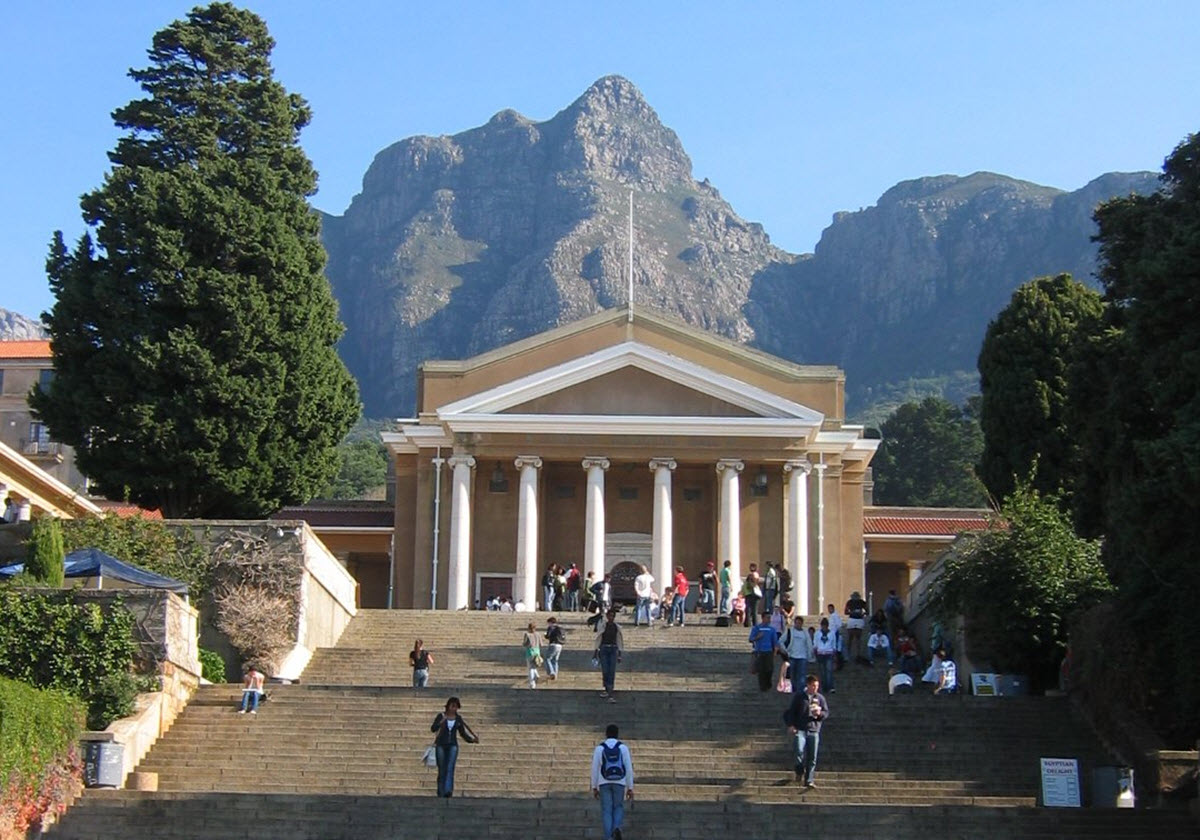The University of Cape Town (UCT) is a public research university in Cape Town, South Africa. Of all the universities in Africa, University of Cape Town ranks highest on the current US News.com list of the best universities worldwide. Of the over 1,700 institutions that were evaluated for the most recent version of the list, University of Cape Town ranked #109.
UCT is also the highest-ranked African university in the QS World University Rankings, the Times Higher Education World University Rankings, and the Academic Ranking of World Universities, and UCT is the only African member of the Global University Leaders Forum (GULF).
The Commerce, Law, and Medicine Faculties of UCT are especially highly regarded and consistently placed among the hundred best in international rankings.

UCT has roots going back to 1829, when the South African College was established. This makes it the oldest extant institute for higher education in South Africa. UCT and Stellenbosch University (both in South Africa) attained full university status on the same day in 1918, making them the oldest full-status universities, not just in South Africa, but in the whole Sub-Saharan Africa region.
Today, the university is organized into six different faculties + the multidisciplinary Centre for Higher Education Development. The degrees ranges from bachelor’s (NQF 7) to doctoral (NQF 10).
Based in Cape Town, this university has two urban campuses and four suburban campuses.
For 2022, the student enrolment was 28,200+ students. For that same year, the academic staff at UCT was comprised of over 1,175 academics, and there were also over 3,175 administrative staff members. Data from 2020 shows 35 UCT staff members as A-rated NRF researchers, constituting 30% of the national total.
Short facts about UCT
Language
English
Motto
Spes Bona (Good Hope)
Academic affiliations
- AAU (Association of African Universities)
- ACU (Association of Commonwealth Universities)
- CHEC (Cape Higher Education Consortium)
- HESA (Higher Education in South Africa)
- IARU (International Alliance of Research Universities)
- IAU (International Association of Universities)
- WUN (Worldwide Universities Network)
Nobel laureates
As of 2022, five alumni of the UCT have been awarded with the Nobel Prize.
- The United States-born political scientist and diplomat Ralph Bunche was awarded the Nobel Peace Prize in 1950 for his role in the 1949 Armistice Agreements.
- The viroligist Max Theiler was awarded the 1951 Nobel Prize in Physiology or Medicine for developing a vaccine against yellow fever.
- The physics professor Allan McLeod Cormack was awarded the 1979 Nobel Prize in Medicine for his work on X-ray computed tomography.
- The chemist and biophysicist Sir Aaron Klug was awarded the 1982 Nobel Prize in Chemistry for his development of crystallographic electron microscopy and his structural elucidation of biologically important nucleic acid-protein complexes.
- Professor Emeritus J. M. Coetzee was awarded the 2003 Nobel Prize in Literature.
Colours
Light blue, dark blue, black, white
Nickname
- Ikeys
- In 1960-1990, UCT earned the nickname “Moscow on the Hill” for its sustained opposition to apartheid, especially in higher education.

Mascot
Tiger
Student body
- For the year 2022, the student enrolment was 28,200+ students.
- Women students were first admitted to UCT in 1886. By 2004, nearly 50% of the students were women.
- Black students were first admitted to UCT in the 1920s. The proportion of black students rose noticeably in the 1980s and 1990s, and by 2004, nearly 50% of UCT´s circa 20,000 students were black.
- There are over one hundred student societies and clubs, e.g. for sport and other physical activities, academic subjects, culture, country/ethnicity, religion, politics & civics, and community outreach.
Campuses
Based in Cape Town, this university has two urban campuses and four suburban campuses.
- The Upper Campus is located on the Rhodes Estate, on the slopes of Devil´s Peak. The faculties of Science, Engineering, Commerce, and Humanities are here, except for the Department of Arts. This is also where you find the main UCT library: The Chancellor Oppenheimer Library. The oldest buildings at Upper Campus were built in 1928-1930.
- The Middle and Lower Campuses are nor far from the Upper Campus, but separated by the M3 expressway and sports fields. These campuses are spread throughout the suburbs Rondebosch, Rosebank and Mowbray. You will find the Faculty of Law, the School of Economics, and the South African College of Music here.
Collectively, the Upper, Middle & Lower Campuses are sometimes referred to as the Main Campus.
- The Medical School campus, home to the Faculty of Health Sciences, is located in the Cape Town suburb Observator, next to the Groote Schuur Hospital.
- The Hiddingh Campus in central Cape Town is home to the Fine Arts and Drama departments. This campus includes the Egyptian Building, which was built in 1841 to house the South African College.
- The Breakwater Lodge Campus at the Victoria & Alfred Waterfront is home to the UCT Graduate School of Business. Breakwater Lodge was built in 1859 and used to be a prison.